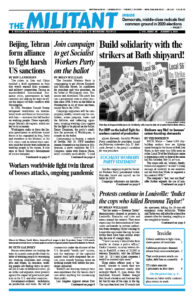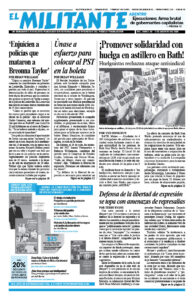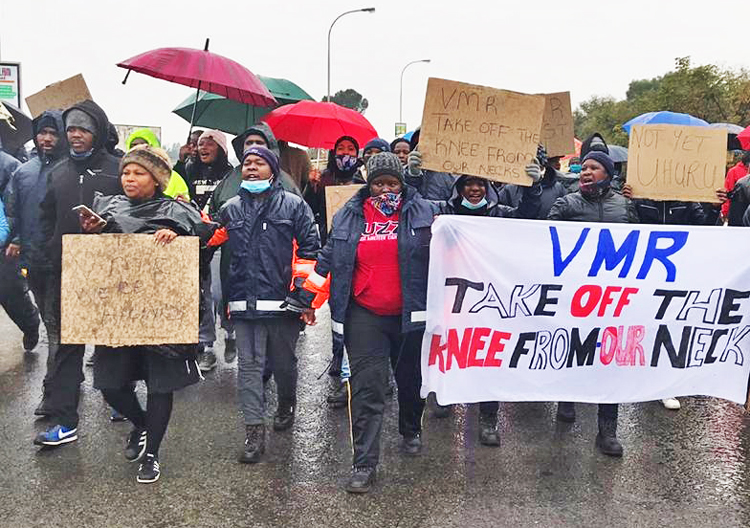Bosses everywhere are looking for ways to squeeze more profits from the labor of working people by worsening our working conditions and cutting jobs and wages. In response, working people are finding ways to carry out job actions to defend ourselves, go on strike and organize street protests against the impact of government policies in the U.S. and other countries.
Government-ordered lockdowns on production and trade, the toll of coronavirus under the disaster of the U.S. for-profit “health care” system, and the workings of the capitalist market itself have deepened the social crisis already bearing down on working people well before the pandemic appeared.
Workers are learning through their own experience that the bosses don’t care about anything but maximizing their profits.
Los Angeles Apparel owner Dov Charney told the Los Angeles Times in early July that the company was “following every directive we’re aware of” to prevent garment workers at the plant from getting COVID-19.
But that’s not how workers there see it. Some 300 of the company’s 1,800 workers tested positive and four died, while the company pressed for production and turned a blind eye to dangerous working conditions.
Two-hour stoppage at L.A. Apparel
As the truth about the spread of the disease in the plant filtered out, dozens stood by their sewing machines and refused to work for nearly two hours in June. “We got up, and we said we’re not going to work until you promise to clean the machines,” said Mariana, who agreed to be identified by the Times by her middle name to avoid retaliation by the bosses.
The stoppage forced Charney to meet with the workers and make some changes. They were given more space and cleaning was improved. Since then the plant has been closed by the county health department, until violations of health regulations are corrected. After seeing the improvements their job action won, many workers plan to return when the plant reopens.
At Farmer John meatpacking plant in Vernon, California, where many workers got sick from the virus, delegations of workers from different departments went to the office in April in the face of the bosses’ inaction. “The company didn’t take seriously the need to take preventative steps,” Pedro Albarrán told the Militant July 18. Albarrán is a meat cutter and shop steward for United Food and Commercial Workers Local 770.
“We told them we need more protection,” he said. “Our focus was on having more distance between workers,” as well as more frequent cleaning.
The company increased the distance between workers in some parts of the plant but not others. Where Albarrán works “they added plexiglass, but it’s so close that your shoulders and arms bump into it all day, it’s very uncomfortable.”
“We want a committee of workers to monitor this, identify problems and begin to resolve them,” he said. A joint company-union safety committee called for in the contract doesn’t meet. “The company does what it wants to,” he said.
The conditions facing workers at Los Angeles Apparel and Farmer John show that what is needed to ensure that all work is carried out safely under all conditions is to advance a fight for workers control of production. Workers need to fight for the right to determine line speed, how work is organized, as well as what is produced and its quality.
Workers fight boss, gov’t attacks
In Durango, Mexico, more than 200 mine and metal processing workers at the San José Avino mine went on strike July 11 after the company refused to pay the annual profit sharing bonus. In Uruguay, workers went on strike July 8 at the CITA bus company, when bosses unilaterally changed pay, waiting and mileage rates, resulting in a 30% pay cut.
In Israel, for the fourth time in a week, thousands of angry workers took to the streets July 18 against government attacks. Some 2,000 protested outside Prime Minister Benjamin Netanyahu’s official residence in Jerusalem while thousands more protested in Tel Aviv.
The police had refused to grant a permit to a coalition of small and medium-size businesses, including restaurant and bar owners, to protest in Tel Aviv’s Rabin Square demanding more government aid and eased restrictions. The cops said the plaza could only hold 1,800 people under social distancing rules. So organizers took the group to Charles Clore Park, joining another protest in progress organized by the “anti-corruption” Black Flag movement and the recently formed Association of the Unemployed.
“I have not had a pay slip for four months now, and I am receiving unemployment benefits in the amount of 60% of the salary I had,” laid-off hotel receptionist Yoav Haravan, a leader of the Association of the Unemployed, told the press. “My rent remained at 100%, monthly bills remained at 100% and grocery shopping remained at 100%.”
Meanwhile, a one-day national strike in Israel July 20 called by the National Association of Nurses shut down elective surgeries and nonemergency care. The nurses won their central demand, with the government agreeing to provide funds to hire 2,000 more nurses, 400 doctors and 700 support staff.
Compared to the U.S., Europe and China, most of Africa has not yet been as hard hit by COVID-19. Still coronavirus cases have more than doubled over the last month in 22 of the continent’s 54 countries. South Africa is hardest hit.
Eighteen workers, members of the National Union of Mineworkers and the National Union of Metalworkers, were arrested in Orkney, South Africa, July 13 for protesting nonpayment of wages and layoffs at Kopanang and Tau Lekoa gold mines and the West Gold Plant. They were charged with violating COVID-19 lockdown rules and released two days later.
Some 1,500 migrant workers from Botswana, Eswatini, Lesotho and Mozambique, as well as 146 local workers employed at the sites, have not been paid since the government-imposed lockdown in March, according to the IndustriALL international union federation.
“If the retrenchments were made during the lockdown, why can’t we protest during the lockdown?” picketing Kopanang mine worker Junior Kgoedi told the press.
Deepening social crisis of capitalism
According to the July 16 Wall Street Journal, 7.5 million jobs were added in May and June in the U.S, after 21 million were cut in March and April.
The next day the paper reported that in the past two weeks job postings had declined in all 50 states and Washington, D.C. For the week ending July 11, 1.3 million workers filed for unemployment benefits, the 17th straight week that new claims exceeded 1 million. Many of the job losses, especially in small businesses, are permanent. Millions are without jobs.
As a consequence, workers face rising competition to get jobs, a fact bosses utilize to their advantage as they press their attacks on the wages and conditions of those still working and try to undermine working-class solidarity.
In addition, government-ordered shutdowns and shelter in place orders are making the yearslong social crisis that falls hardest on the working class even worse. In St. Paul, Minnesota, officials say there are now 84 homeless campsites with 270 people, a tenfold increase from last summer.
With millions across the U.S. late on their rent and mortgage payments no one knows how many will be forced onto the street when coronavirus eviction moratoriums — and the $600 federal weekly unemployment supplement — end at the end of this month.
Food banks coast to coast have been overwhelmed. Radha Muthiah, president of the Capital Area Food Bank, told WAMU radio in Washington, D.C., that the number of people getting meals at the 450 locations they supply has risen anywhere from 30% to 400% in the last few months.
Suicide and drug overdoses
Well before the lockdowns, which pushed millions to “self-isolate,” drug addiction, alcoholism and suicide were on the rise. According to the Centers for Disease Control and Prevention, overdose deaths increased 4.8% in 2019 from the year before.
The Washington Post reports that suspected overdoses jumped 18% in March, 29% in April, and 42% in May! In Monroe County in upstate New York, deaths from opioid overdoses have doubled since last year.
But don’t expect help from the government, whether it’s the Democratic or Republican Party that’s in control. In early July New York Democratic Gov. Andrew Cuomo announced an immediate 31% cut in funding for substance abuse addiction treatment programs.
Whatever the ups and downs, there is no end in sight to the capitalist crisis, and the bosses’ attempts to rebuild their profits at the expense of working people.
That also means there will be no end to working people finding ways to stand up and organize together, as striking shipyard workers in Bath, Maine, are doing. As we do so, workers can learn from each other’s struggles and forge a road to increased resistance and working-class solidarity.


